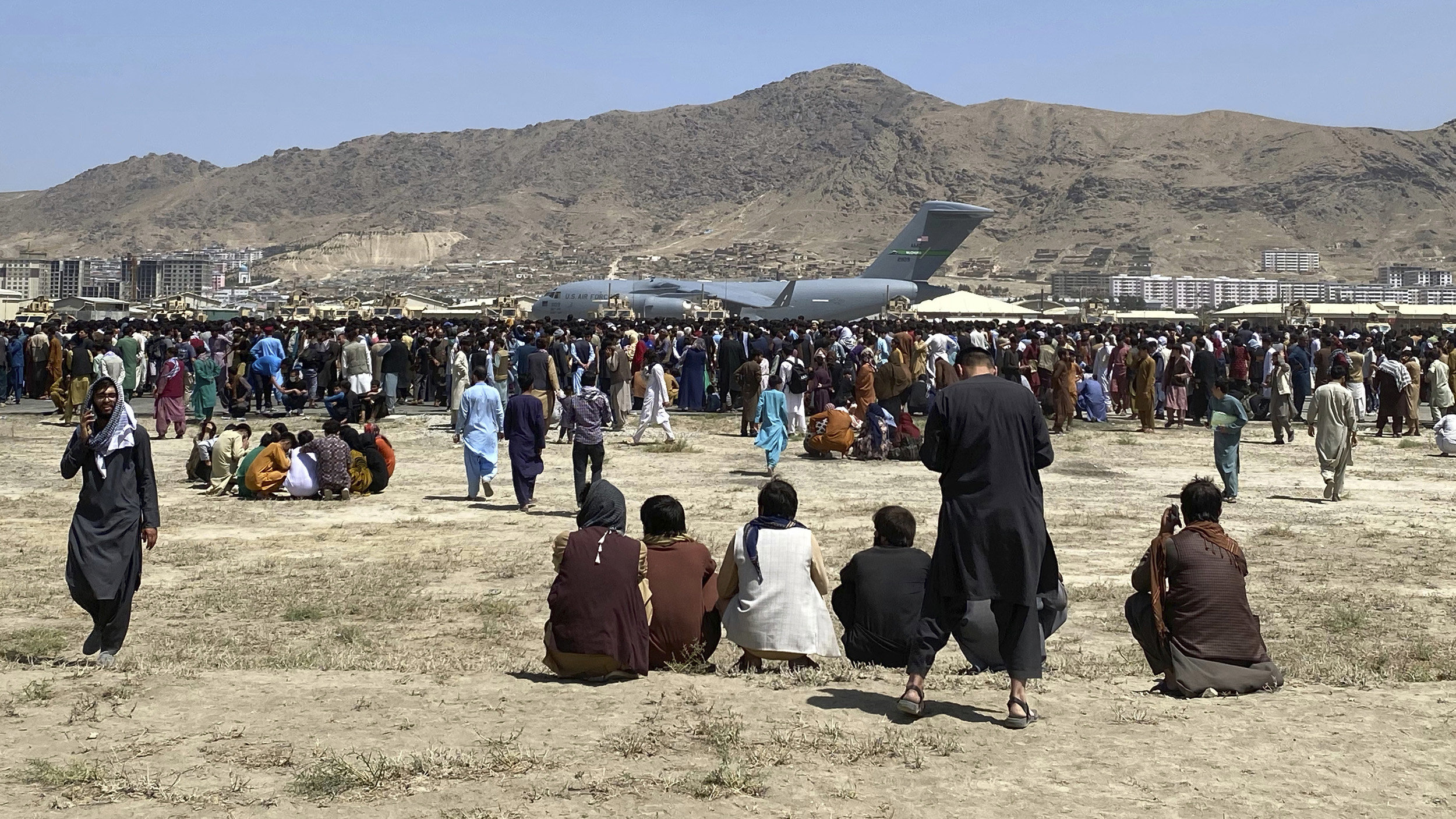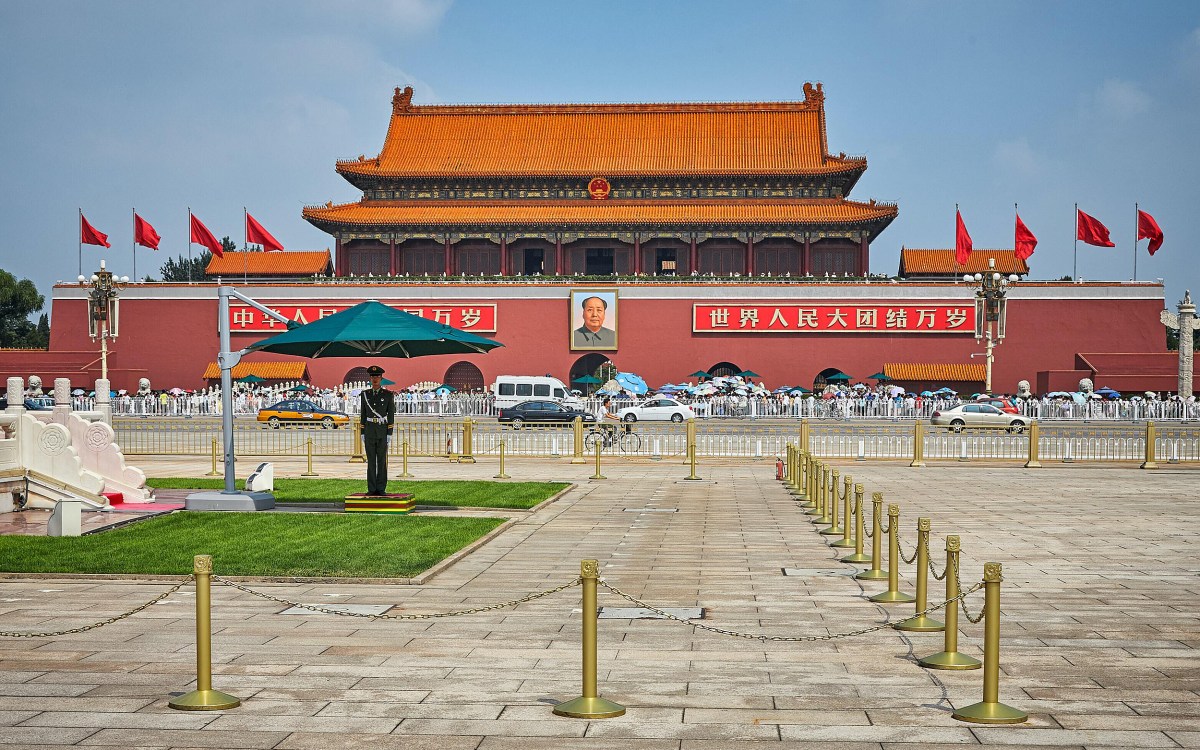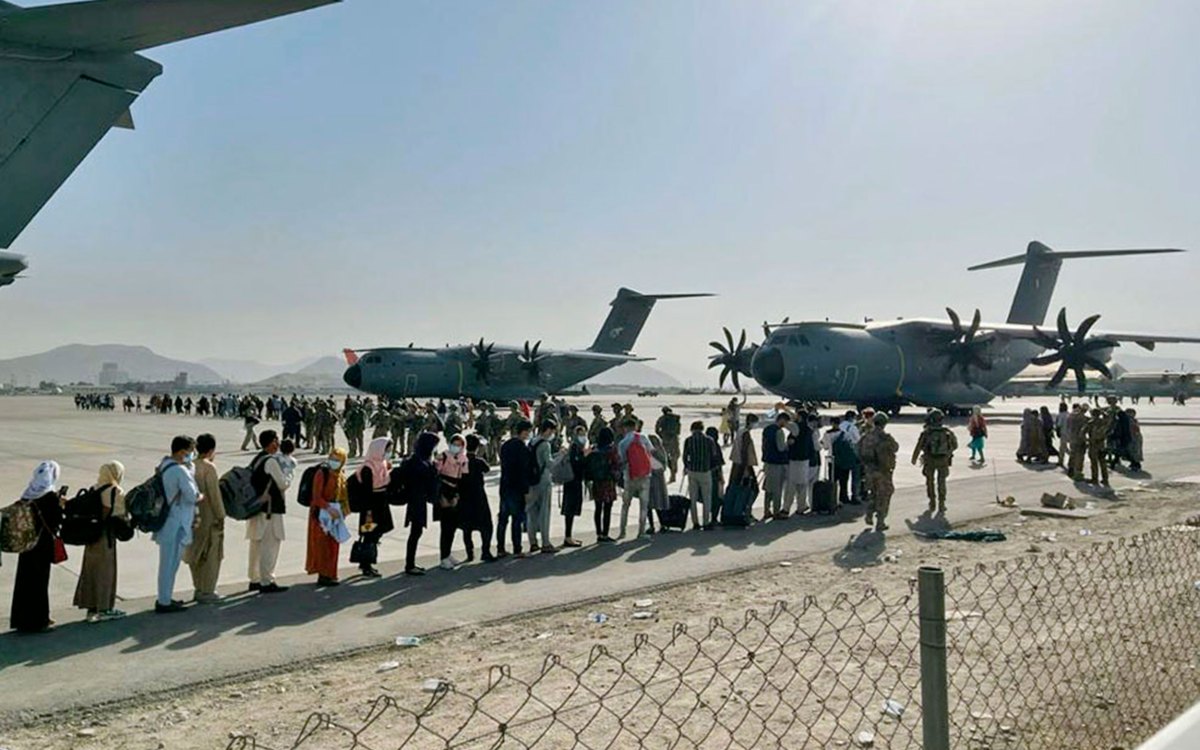
People trying to flee Afghanistan amid U.S. troops’ withdrawal in August gather outside Kabul’s airport.
AP file photo
Dangers lurk in wake of U.S. pullout in Afghanistan
Shrinking U.S. Mideast presence, growing Chinese influence a bad mix, scholars say
Shrinking U.S. interest in the Middle East, along with strengthening ties between China and various countries in the region, could result in thorny, potentially threatening, foreign policy dilemmas in the future, experts say.
Scholars and journalists who took part in Thursday’s panel sponsored by the Weatherhead Center for International Affairs shared their pessimism as they dissected the fallout of the withdrawal of American troops from Afghanistan on the U.S.’s reputation as a reliable ally, global leader, and supporter of democracy and human rights.
The legacy of the U.S. in the region will be forever tarnished, they said. The American occupation of Afghanistan, which began with the ouster of the Taliban by U.S.-led forces in the wake of the attacks on Sept. 11, 2001, had a tragic coda when the Islamic fundamentalists quickly returned to power in the wake of the U.S. exit this summer.
“The U.S. seems no longer invincible and no longer indispensable,” said Mina Al-Oraibi, editor in chief at The National, who took part in the panel from Abu Dhabi. “And the moral authority that they may have claimed is much less so now, particularly after you saw the Afghans trying to flee … and the fact that they would be abandoned by the United States in that way. I think those images will be seared in people’s minds for decades to come.”

Panelists Natalie Colbert (clockwise from top left), Ted Gilman, Joshua Kertzer, Mina Al-Oraibi, Clarissa Ward, and Melani Cammett.
Stephanie Mitchell/Harvard Staff Photographer
Beyond the Afghanistan disaster, panelists said, there are renewed concerns about security threats, including terrorist groups and the Iran nuclear threat, political instability, shifting regional alliances, and China’s rise as a competing superpower in the region. The U.S.’s growing disengagement in the Middle East could complicate matters. The American public seems less supportive of costly foreign interventions and wants the government to prioritize the economy and other domestic matters rather than take leadership on international issues, said Joshua Kertzer, Paul Sack Associate Professor of Political Economy in the Department of Government.
“The Middle East just is no longer a priority to the United States in a way that it was under the previous several administrations,” said Kertzer. “When [President] Biden talks about foreign policy, he’s much more likely to say the words middle class than Middle East.”
The panelists agreed that the U.S. should find a way to maintain its presence in Afghanistan, which could become a safe haven for terrorist groups, and the region in general. Iranian-backed militias could pose a danger to U.S. interests, said Natalie Colbert, executive director of the Belfer Center for Science and International Affairs at Harvard Kennedy School.
“When Biden talks about foreign policy, he’s much more likely to say the words middle class than Middle East.”
Joshua Kertzer, professor of political economy in the Department of Government
The U.S. government should be mindful of the growing role of China, the region’s largest foreign investor, and the role it plays in the relationships between the U.S. and its allies in the region, she said.
“The Chinese have been doing investments in the Middle East for a long time,” said Colbert.
“But in today’s context, an increase in tensions between the U.S. and China is likely to complicate relations with several countries in the Gulf, and particularly those that maintain long-standing security relationships with the U.S., but that are also looking to build more economic ties to China.”
To rebuild its influence, the U.S. could take some cues from China, which is more straightforward and transparent in its dealings with governments in the region, said Clarissa Ward, CNN chief international correspondent. It’s a strategy that could help restore America’s reputation.
“The U.S. foreign policy says one thing and does something else, unlike China, which doesn’t engage in rhetoric about democracy and human rights,” said Ward. “There is a sense among some that China offers potentially a more transactional thing. It’s more transparent as well. It’s ‘What you see is what you get,’ and ‘We give you this, and we take that.’”
Colbert said the way for the U.S. to recover from a trust deficit may be to focus on issues where the U.S. can play a constructive role, and by using multilateral approaches whenever possible. But the lack of a bipartisanship remains a pressing challenge, panelists said. Given the polarizing climate in the U.S., governments in the Middle East are increasingly concerned about making deals or agreements that could be reversed by new administrations.
“Friends and foes of America are trying to understand what the future of American foreign policy is,” said Al-Oraibi. “People would like to see whether the U.S. will go back to a largely bipartisan approach to foreign policy, because at the moment it seems to flip after each election.”
The panel was chaired by Melani Cammett, Clarence Dillon Professor of International Affairs and director of the Weatherhead Center for International Affairs.







